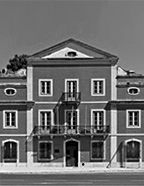

................................
Historiography
I
The first meeting of the Council of the Portuguese Academy of History (APH), the organisation's executive body, was held on 2 December 1937, chaired by António de Vasconcelos (see Part I of this entry). Included among its twenty-five founding members were names such as Captain Abel Fontoura da Costa, a political figure during the First Republic, Alfredo Pimenta, a historian, poet, and polemicist, an anti-liberal intellectual and personal correspondent of Salazar, Damião Peres, coordinator of the História de Portugal [History of Portugal] of Barcelos, Júlio Dantas, a recognised man of letters and President of the Academy of Sciences of Lisbon, Manuel Paulo Merêa, one of the most admired Portuguese Law historians in the 20th century, Marcelo Caetano, a legal historian and future successor of Salazar as President of the Council of Ministers, and, of course, the members of the Academic Council. Other academics also featured João Ameal, author of the História de Portugal [History of Portugal] published by the National Propaganda Secretariat (SPN) and often dubbed the "historian of the Regime" (Torgal, “tempo de ‘ditadura’”, História da história em Portugal, 277 [ "time of 'dictatorship'", History of History in Portugal, 277]), Admiral Gago Coutinho, a historian and one of the first two men to cross the South Atlantic by plane, Charles Ralph Boxer, a British historian of Portuguese and Dutch expansion, Georg Otto Schurhammer, a German expert on the life of St. Francis Xavier, and Gilberto Freyre, a Brazilian historian and sociologist, father of the Luso-Tropicalism theory.
The stage was thus set for a new organisation within the professional field of history. With regular fortnightly meetings throughout the academic year (between October and July), these members would present and discuss their work and effectively join efforts in a more collectively organised academic environment than ever before. The Academic Council, in turn, would guide the work of the historians in observance of the goals of the State, gearing them towards addressing questions on the location of the particular historical events to be commemorated, to managing academic publications, most notably in relation to the commemoration of the Double Centennial of 1939-1940, which culminated in the Portuguese World Exhibition (1940), and by awarding the title of "Academic of Merit" to those academics who had distinguished themselves.
